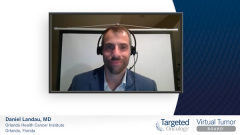
Frontline Treatment Approaches to Nonmetastatic CRPC
Returning to the patient case, experts review available frontline treatment options in the setting of nonmetastatic castration-resistant prostate cancer.
Episodes in this series

Transcript:
Eleni Efstathiou, MD, PhD: This is hindsight. We know from the beginning that this is a high-risk disease and that a single modality such as only the prostatectomy will not suffice. Do I agree that a 59-year-old should be offered that as the option and then add to it? Yes. Until we hear from neoadjuvant trials, which are hopefully going to report in the coming years, we’re not there. We have a lot of young men, and that’s where I want to hear your thoughts. We don’t have representation to hear from radiation oncology or urology, but would you send this man who is arguably young—he’s 59 years old—for consideration first of radiation plus hormones even with a STAMPEDE [trial] model of enhanced androgen signal inhibition, if it was today? I’d like to hear your opinions on that.
Alan Bryce, MD: I agree. With a high-risk patient, it absolutely comes into the conversation. The possibility of a combination of abiraterone plus ADT [androgen deprivation therapy] up front from STAMPEDE is certainly there. Clearly, this is a patient who we’d really like to consider for appropriate clinical trials because the patient is so high risk. We would have been doubtful from the beginning of a positive outcome. In our practice, we probably would have gone to surgery. This is usually the case. Even though we have high-end radiation oncology and urology at this institution most of the time, a 59-year-old man with clinical lack of metastases is going to end up going to surgery. There’s also the issue of looking for long-term outcomes, the risk that he ends up with, and obstructive issues in the long run. It’s nice to have had the surgery in the beginning. You can have radiation as an option later, but your point is well-taken. Radiation up front with enhanced androgen inhibition would have been very appropriate.
Daniel Landau, MD: I completely agree. I’m often of the opinion that if I do meet these patients prior to them making the surgical decision, I try to get them evaluated by both the surgeon and the radiation oncologist. I often offer my 2 cents as well. As we said, with the benefit of hindsight, this was a gentleman who was very likely going to require radiation after prostatectomy for a number of reasons. Perhaps if he had that relationship with a radiation oncologist already, the loss of follow-up may not have come up. Even if he did opt to go for surgery as his primary therapy, there could still have been some value in meeting with the radiation oncologist first.
Eleni Efstathiou, MD, PhD: Absolutely. I want to bring that up actually. Alan and Daniel, you’re great examples of how we should be the quarterbacks at the end of the day for these cases. Usually, they go first to the urologist, but now that systemic treatment is slipping into the early management. We’re given the opportunity in oncology, so we’re also the backbone of internal medicine. That’s our whole training: to help strategize the treatment and bring everyone together, not in this sense of owning, but in the sense of bringing all the disciplines together. One more thing I want to add is that if it was 2022, it's more than likely that a lot of us would have offered a PSMA [prostate-specific membrane antigen]–PET [positron emission tomography] scan for this man, which may have changed the dynamics a little. We need to keep in mind that even if it was oligometastatic disease, we would have been able to offer radiation of the primary. These are some things to keep in mind as we move forward with new modalities.
Alan Bryce, MD: That’s a million-dollar question: How is PSMA going to change our practice in these situations?
Transcript edited for clarity.










































